International Sale of Goods: Application of CISG & SGA Laws
VerifiedAdded on 2023/06/14
|15
|3949
|136
Report
AI Summary
This report examines a hypothetical scenario involving an international sale of goods between Carrie and Shipton, focusing on the applicability of the UN Convention on Contracts for the International Sale of Goods (CISG) and the Sale of Goods Act 1979. It delves into the essential elements of a valid contract under both CISG and SGA, including offer, acceptance, price determination, and the nature of goods. The report also discusses the role of sea waybills and exclusion clauses in international trade agreements. The analysis considers whether Carrie is liable to compensate Shipton for losses incurred due to a breach of obligations, taking into account the principles of party autonomy, reasonableness, and good faith as enshrined in the CISG. The report also references relevant case laws such as Hillas v Arcos, L’Estrange v Graucob , Olley v Marlborough Court and Hadley v Baxendale to further analyze the legal implications.
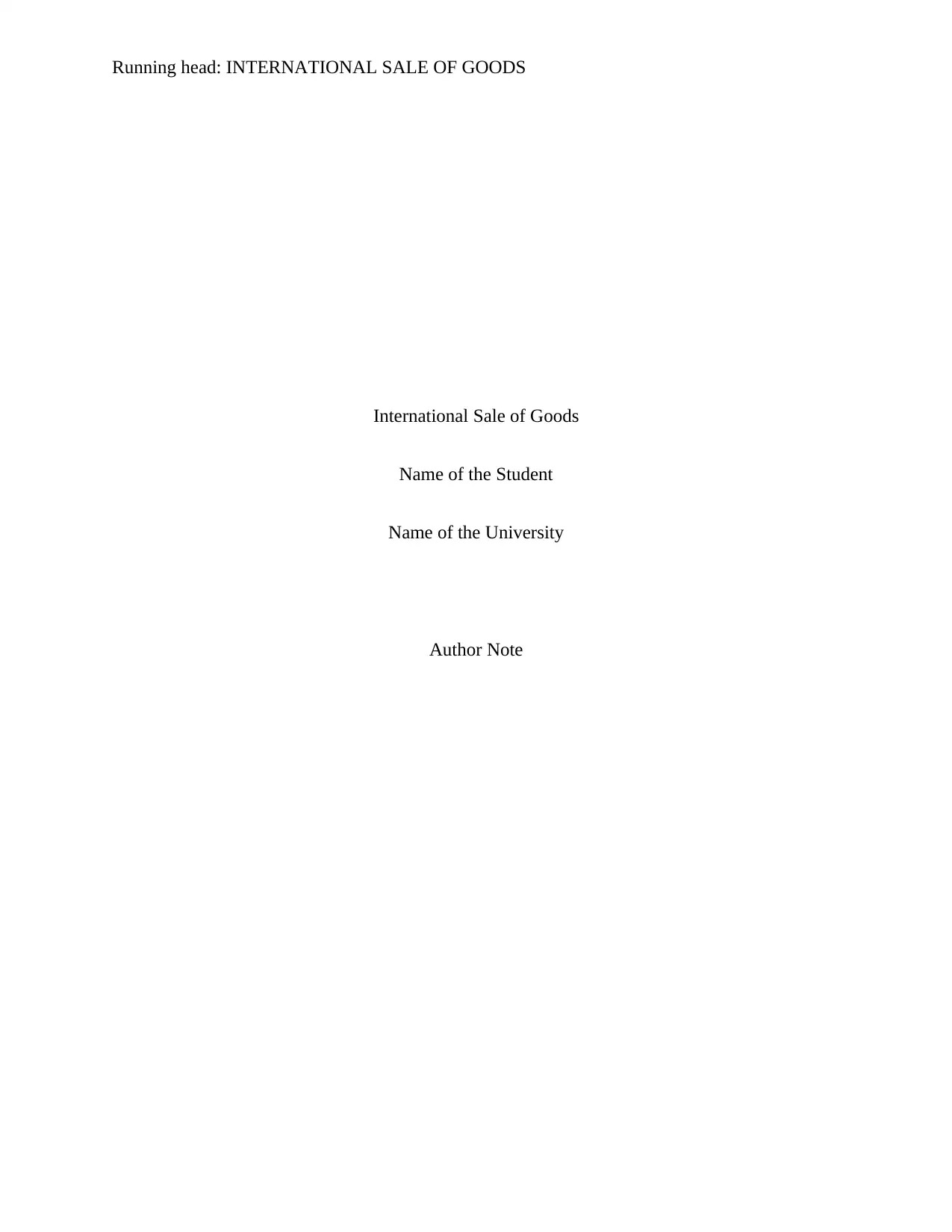
Running head: INTERNATIONAL SALE OF GOODS
International Sale of Goods
Name of the Student
Name of the University
Author Note
International Sale of Goods
Name of the Student
Name of the University
Author Note
Paraphrase This Document
Need a fresh take? Get an instant paraphrase of this document with our AI Paraphraser
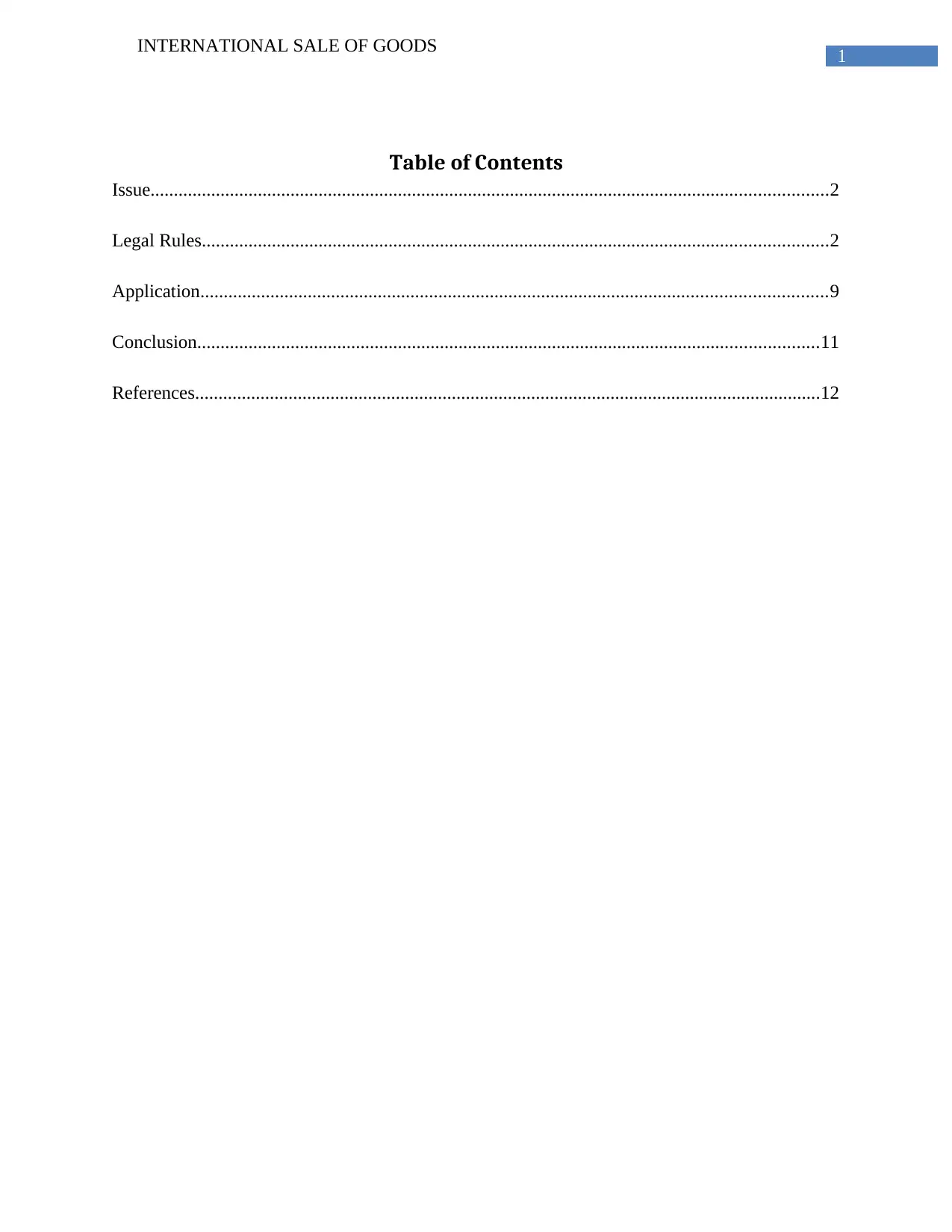
1
INTERNATIONAL SALE OF GOODS
Table of Contents
Issue.................................................................................................................................................2
Legal Rules......................................................................................................................................2
Application......................................................................................................................................9
Conclusion.....................................................................................................................................11
References......................................................................................................................................12
INTERNATIONAL SALE OF GOODS
Table of Contents
Issue.................................................................................................................................................2
Legal Rules......................................................................................................................................2
Application......................................................................................................................................9
Conclusion.....................................................................................................................................11
References......................................................................................................................................12
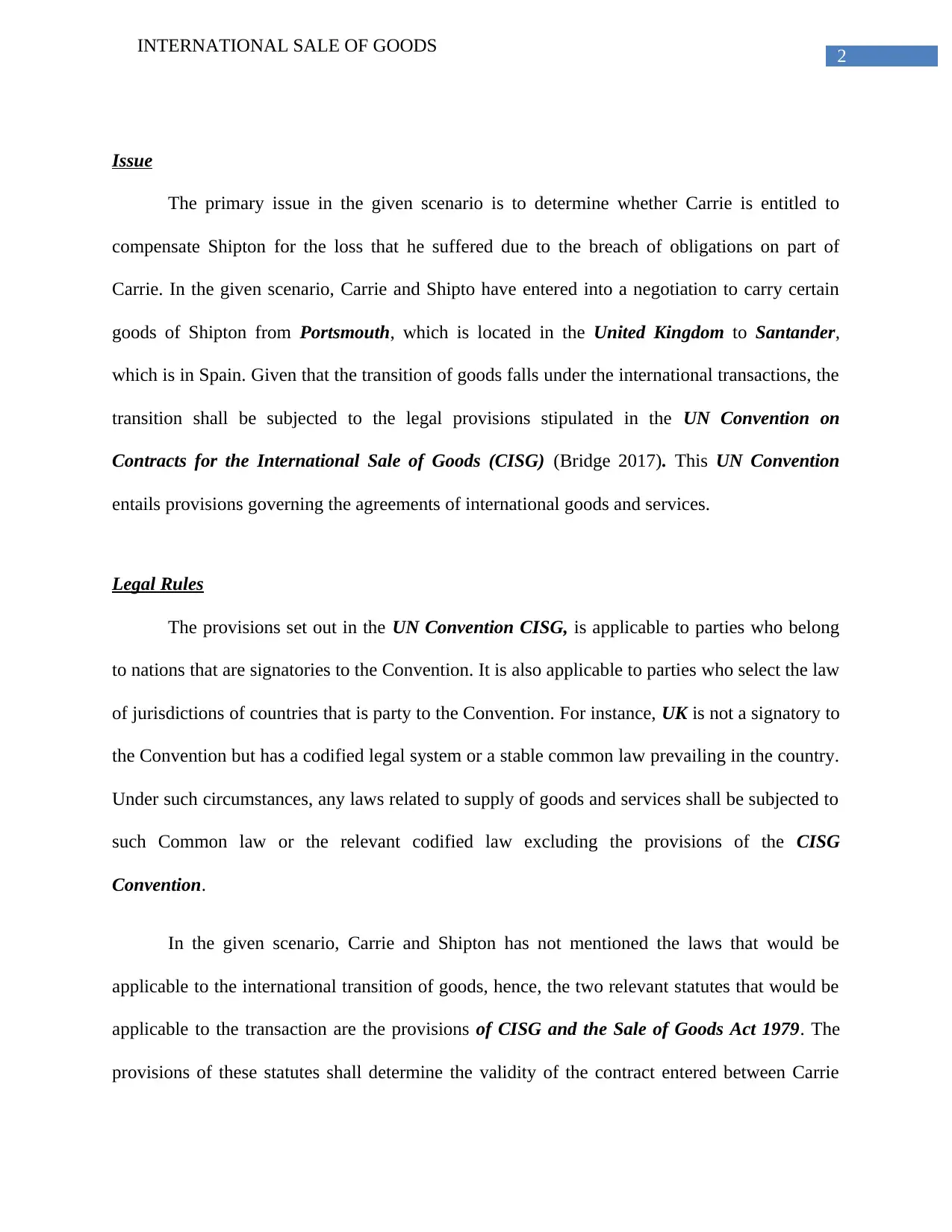
2
INTERNATIONAL SALE OF GOODS
Issue
The primary issue in the given scenario is to determine whether Carrie is entitled to
compensate Shipton for the loss that he suffered due to the breach of obligations on part of
Carrie. In the given scenario, Carrie and Shipto have entered into a negotiation to carry certain
goods of Shipton from Portsmouth, which is located in the United Kingdom to Santander,
which is in Spain. Given that the transition of goods falls under the international transactions, the
transition shall be subjected to the legal provisions stipulated in the UN Convention on
Contracts for the International Sale of Goods (CISG) (Bridge 2017). This UN Convention
entails provisions governing the agreements of international goods and services.
Legal Rules
The provisions set out in the UN Convention CISG, is applicable to parties who belong
to nations that are signatories to the Convention. It is also applicable to parties who select the law
of jurisdictions of countries that is party to the Convention. For instance, UK is not a signatory to
the Convention but has a codified legal system or a stable common law prevailing in the country.
Under such circumstances, any laws related to supply of goods and services shall be subjected to
such Common law or the relevant codified law excluding the provisions of the CISG
Convention.
In the given scenario, Carrie and Shipton has not mentioned the laws that would be
applicable to the international transition of goods, hence, the two relevant statutes that would be
applicable to the transaction are the provisions of CISG and the Sale of Goods Act 1979. The
provisions of these statutes shall determine the validity of the contract entered between Carrie
INTERNATIONAL SALE OF GOODS
Issue
The primary issue in the given scenario is to determine whether Carrie is entitled to
compensate Shipton for the loss that he suffered due to the breach of obligations on part of
Carrie. In the given scenario, Carrie and Shipto have entered into a negotiation to carry certain
goods of Shipton from Portsmouth, which is located in the United Kingdom to Santander,
which is in Spain. Given that the transition of goods falls under the international transactions, the
transition shall be subjected to the legal provisions stipulated in the UN Convention on
Contracts for the International Sale of Goods (CISG) (Bridge 2017). This UN Convention
entails provisions governing the agreements of international goods and services.
Legal Rules
The provisions set out in the UN Convention CISG, is applicable to parties who belong
to nations that are signatories to the Convention. It is also applicable to parties who select the law
of jurisdictions of countries that is party to the Convention. For instance, UK is not a signatory to
the Convention but has a codified legal system or a stable common law prevailing in the country.
Under such circumstances, any laws related to supply of goods and services shall be subjected to
such Common law or the relevant codified law excluding the provisions of the CISG
Convention.
In the given scenario, Carrie and Shipton has not mentioned the laws that would be
applicable to the international transition of goods, hence, the two relevant statutes that would be
applicable to the transaction are the provisions of CISG and the Sale of Goods Act 1979. The
provisions of these statutes shall determine the validity of the contract entered between Carrie
⊘ This is a preview!⊘
Do you want full access?
Subscribe today to unlock all pages.

Trusted by 1+ million students worldwide
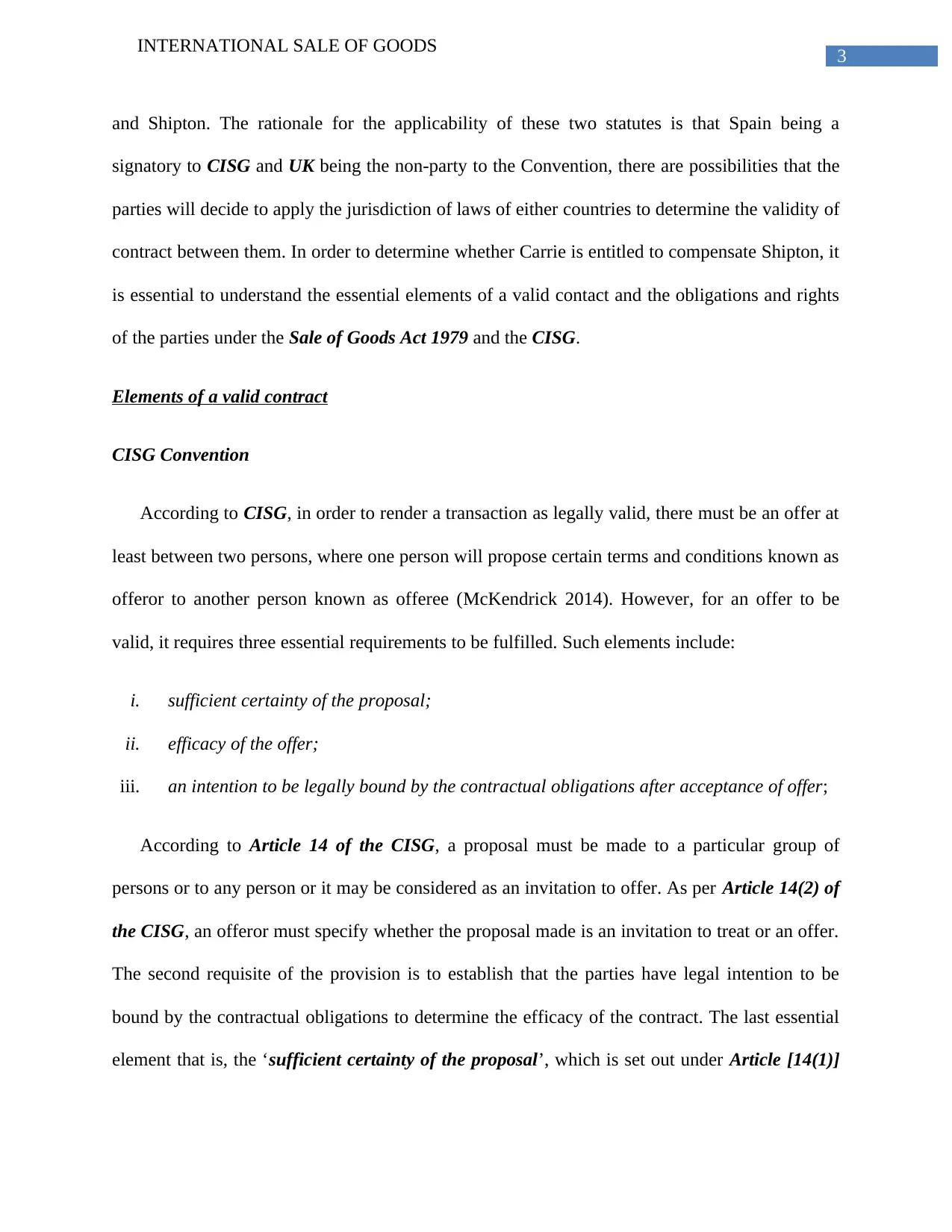
3
INTERNATIONAL SALE OF GOODS
and Shipton. The rationale for the applicability of these two statutes is that Spain being a
signatory to CISG and UK being the non-party to the Convention, there are possibilities that the
parties will decide to apply the jurisdiction of laws of either countries to determine the validity of
contract between them. In order to determine whether Carrie is entitled to compensate Shipton, it
is essential to understand the essential elements of a valid contact and the obligations and rights
of the parties under the Sale of Goods Act 1979 and the CISG.
Elements of a valid contract
CISG Convention
According to CISG, in order to render a transaction as legally valid, there must be an offer at
least between two persons, where one person will propose certain terms and conditions known as
offeror to another person known as offeree (McKendrick 2014). However, for an offer to be
valid, it requires three essential requirements to be fulfilled. Such elements include:
i. sufficient certainty of the proposal;
ii. efficacy of the offer;
iii. an intention to be legally bound by the contractual obligations after acceptance of offer;
According to Article 14 of the CISG, a proposal must be made to a particular group of
persons or to any person or it may be considered as an invitation to offer. As per Article 14(2) of
the CISG, an offeror must specify whether the proposal made is an invitation to treat or an offer.
The second requisite of the provision is to establish that the parties have legal intention to be
bound by the contractual obligations to determine the efficacy of the contract. The last essential
element that is, the ‘sufficient certainty of the proposal’, which is set out under Article [14(1)]
INTERNATIONAL SALE OF GOODS
and Shipton. The rationale for the applicability of these two statutes is that Spain being a
signatory to CISG and UK being the non-party to the Convention, there are possibilities that the
parties will decide to apply the jurisdiction of laws of either countries to determine the validity of
contract between them. In order to determine whether Carrie is entitled to compensate Shipton, it
is essential to understand the essential elements of a valid contact and the obligations and rights
of the parties under the Sale of Goods Act 1979 and the CISG.
Elements of a valid contract
CISG Convention
According to CISG, in order to render a transaction as legally valid, there must be an offer at
least between two persons, where one person will propose certain terms and conditions known as
offeror to another person known as offeree (McKendrick 2014). However, for an offer to be
valid, it requires three essential requirements to be fulfilled. Such elements include:
i. sufficient certainty of the proposal;
ii. efficacy of the offer;
iii. an intention to be legally bound by the contractual obligations after acceptance of offer;
According to Article 14 of the CISG, a proposal must be made to a particular group of
persons or to any person or it may be considered as an invitation to offer. As per Article 14(2) of
the CISG, an offeror must specify whether the proposal made is an invitation to treat or an offer.
The second requisite of the provision is to establish that the parties have legal intention to be
bound by the contractual obligations to determine the efficacy of the contract. The last essential
element that is, the ‘sufficient certainty of the proposal’, which is set out under Article [14(1)]
Paraphrase This Document
Need a fresh take? Get an instant paraphrase of this document with our AI Paraphraser
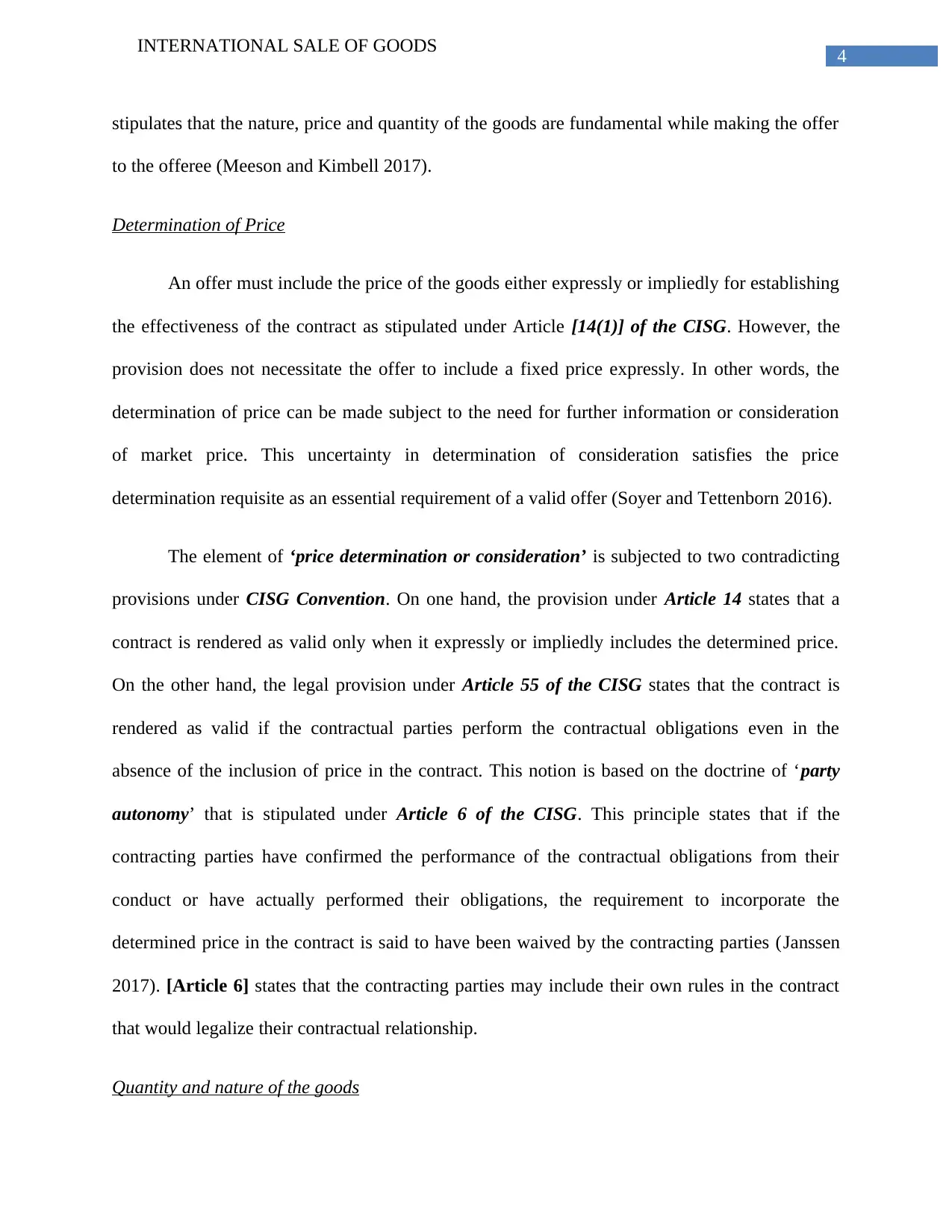
4
INTERNATIONAL SALE OF GOODS
stipulates that the nature, price and quantity of the goods are fundamental while making the offer
to the offeree (Meeson and Kimbell 2017).
Determination of Price
An offer must include the price of the goods either expressly or impliedly for establishing
the effectiveness of the contract as stipulated under Article [14(1)] of the CISG. However, the
provision does not necessitate the offer to include a fixed price expressly. In other words, the
determination of price can be made subject to the need for further information or consideration
of market price. This uncertainty in determination of consideration satisfies the price
determination requisite as an essential requirement of a valid offer (Soyer and Tettenborn 2016).
The element of ‘price determination or consideration’ is subjected to two contradicting
provisions under CISG Convention. On one hand, the provision under Article 14 states that a
contract is rendered as valid only when it expressly or impliedly includes the determined price.
On the other hand, the legal provision under Article 55 of the CISG states that the contract is
rendered as valid if the contractual parties perform the contractual obligations even in the
absence of the inclusion of price in the contract. This notion is based on the doctrine of ‘party
autonomy’ that is stipulated under Article 6 of the CISG. This principle states that if the
contracting parties have confirmed the performance of the contractual obligations from their
conduct or have actually performed their obligations, the requirement to incorporate the
determined price in the contract is said to have been waived by the contracting parties (Janssen
2017). [Article 6] states that the contracting parties may include their own rules in the contract
that would legalize their contractual relationship.
Quantity and nature of the goods
INTERNATIONAL SALE OF GOODS
stipulates that the nature, price and quantity of the goods are fundamental while making the offer
to the offeree (Meeson and Kimbell 2017).
Determination of Price
An offer must include the price of the goods either expressly or impliedly for establishing
the effectiveness of the contract as stipulated under Article [14(1)] of the CISG. However, the
provision does not necessitate the offer to include a fixed price expressly. In other words, the
determination of price can be made subject to the need for further information or consideration
of market price. This uncertainty in determination of consideration satisfies the price
determination requisite as an essential requirement of a valid offer (Soyer and Tettenborn 2016).
The element of ‘price determination or consideration’ is subjected to two contradicting
provisions under CISG Convention. On one hand, the provision under Article 14 states that a
contract is rendered as valid only when it expressly or impliedly includes the determined price.
On the other hand, the legal provision under Article 55 of the CISG states that the contract is
rendered as valid if the contractual parties perform the contractual obligations even in the
absence of the inclusion of price in the contract. This notion is based on the doctrine of ‘party
autonomy’ that is stipulated under Article 6 of the CISG. This principle states that if the
contracting parties have confirmed the performance of the contractual obligations from their
conduct or have actually performed their obligations, the requirement to incorporate the
determined price in the contract is said to have been waived by the contracting parties (Janssen
2017). [Article 6] states that the contracting parties may include their own rules in the contract
that would legalize their contractual relationship.
Quantity and nature of the goods
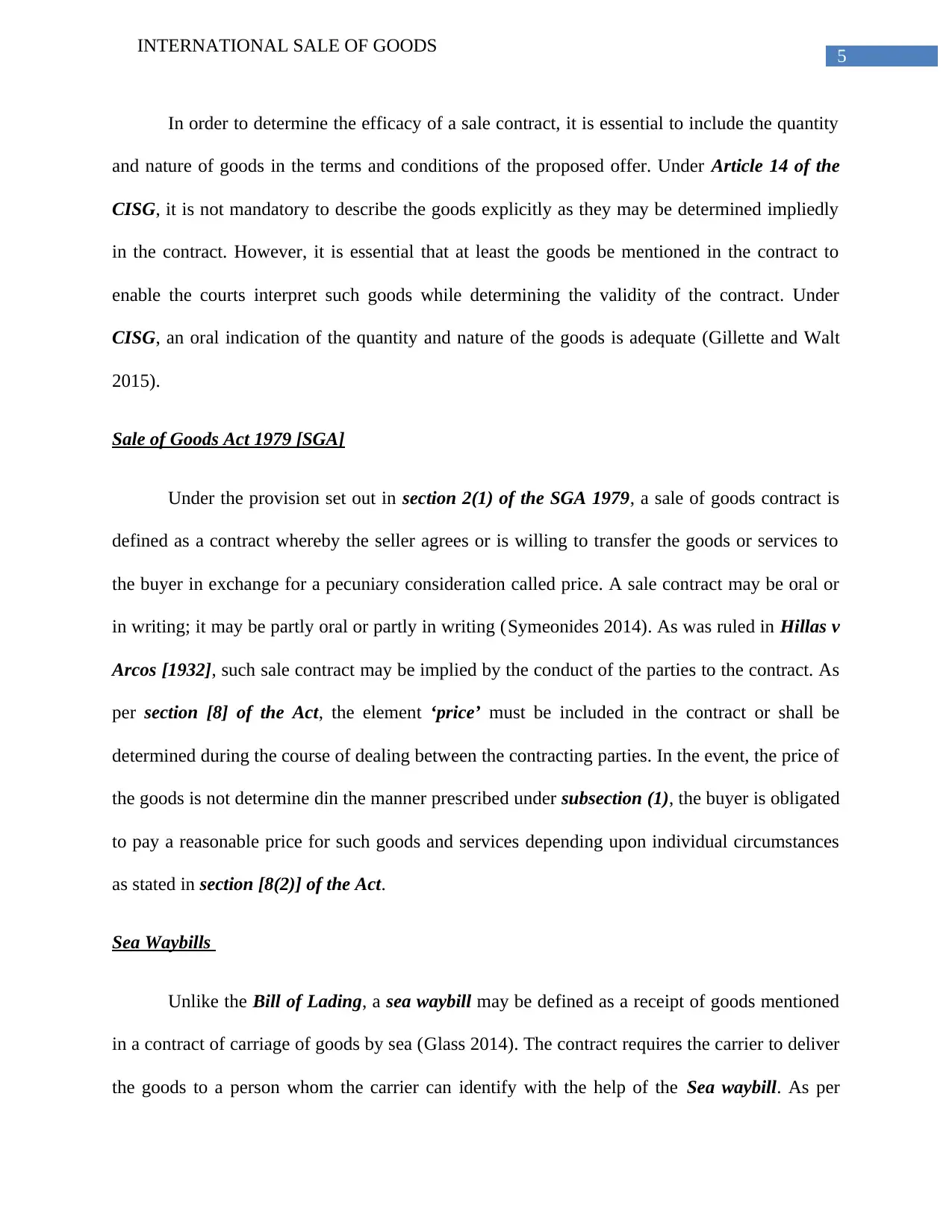
5
INTERNATIONAL SALE OF GOODS
In order to determine the efficacy of a sale contract, it is essential to include the quantity
and nature of goods in the terms and conditions of the proposed offer. Under Article 14 of the
CISG, it is not mandatory to describe the goods explicitly as they may be determined impliedly
in the contract. However, it is essential that at least the goods be mentioned in the contract to
enable the courts interpret such goods while determining the validity of the contract. Under
CISG, an oral indication of the quantity and nature of the goods is adequate (Gillette and Walt
2015).
Sale of Goods Act 1979 [SGA]
Under the provision set out in section 2(1) of the SGA 1979, a sale of goods contract is
defined as a contract whereby the seller agrees or is willing to transfer the goods or services to
the buyer in exchange for a pecuniary consideration called price. A sale contract may be oral or
in writing; it may be partly oral or partly in writing (Symeonides 2014). As was ruled in Hillas v
Arcos [1932], such sale contract may be implied by the conduct of the parties to the contract. As
per section [8] of the Act, the element ‘price’ must be included in the contract or shall be
determined during the course of dealing between the contracting parties. In the event, the price of
the goods is not determine din the manner prescribed under subsection (1), the buyer is obligated
to pay a reasonable price for such goods and services depending upon individual circumstances
as stated in section [8(2)] of the Act.
Sea Waybills
Unlike the Bill of Lading, a sea waybill may be defined as a receipt of goods mentioned
in a contract of carriage of goods by sea (Glass 2014). The contract requires the carrier to deliver
the goods to a person whom the carrier can identify with the help of the Sea waybill. As per
INTERNATIONAL SALE OF GOODS
In order to determine the efficacy of a sale contract, it is essential to include the quantity
and nature of goods in the terms and conditions of the proposed offer. Under Article 14 of the
CISG, it is not mandatory to describe the goods explicitly as they may be determined impliedly
in the contract. However, it is essential that at least the goods be mentioned in the contract to
enable the courts interpret such goods while determining the validity of the contract. Under
CISG, an oral indication of the quantity and nature of the goods is adequate (Gillette and Walt
2015).
Sale of Goods Act 1979 [SGA]
Under the provision set out in section 2(1) of the SGA 1979, a sale of goods contract is
defined as a contract whereby the seller agrees or is willing to transfer the goods or services to
the buyer in exchange for a pecuniary consideration called price. A sale contract may be oral or
in writing; it may be partly oral or partly in writing (Symeonides 2014). As was ruled in Hillas v
Arcos [1932], such sale contract may be implied by the conduct of the parties to the contract. As
per section [8] of the Act, the element ‘price’ must be included in the contract or shall be
determined during the course of dealing between the contracting parties. In the event, the price of
the goods is not determine din the manner prescribed under subsection (1), the buyer is obligated
to pay a reasonable price for such goods and services depending upon individual circumstances
as stated in section [8(2)] of the Act.
Sea Waybills
Unlike the Bill of Lading, a sea waybill may be defined as a receipt of goods mentioned
in a contract of carriage of goods by sea (Glass 2014). The contract requires the carrier to deliver
the goods to a person whom the carrier can identify with the help of the Sea waybill. As per
⊘ This is a preview!⊘
Do you want full access?
Subscribe today to unlock all pages.

Trusted by 1+ million students worldwide
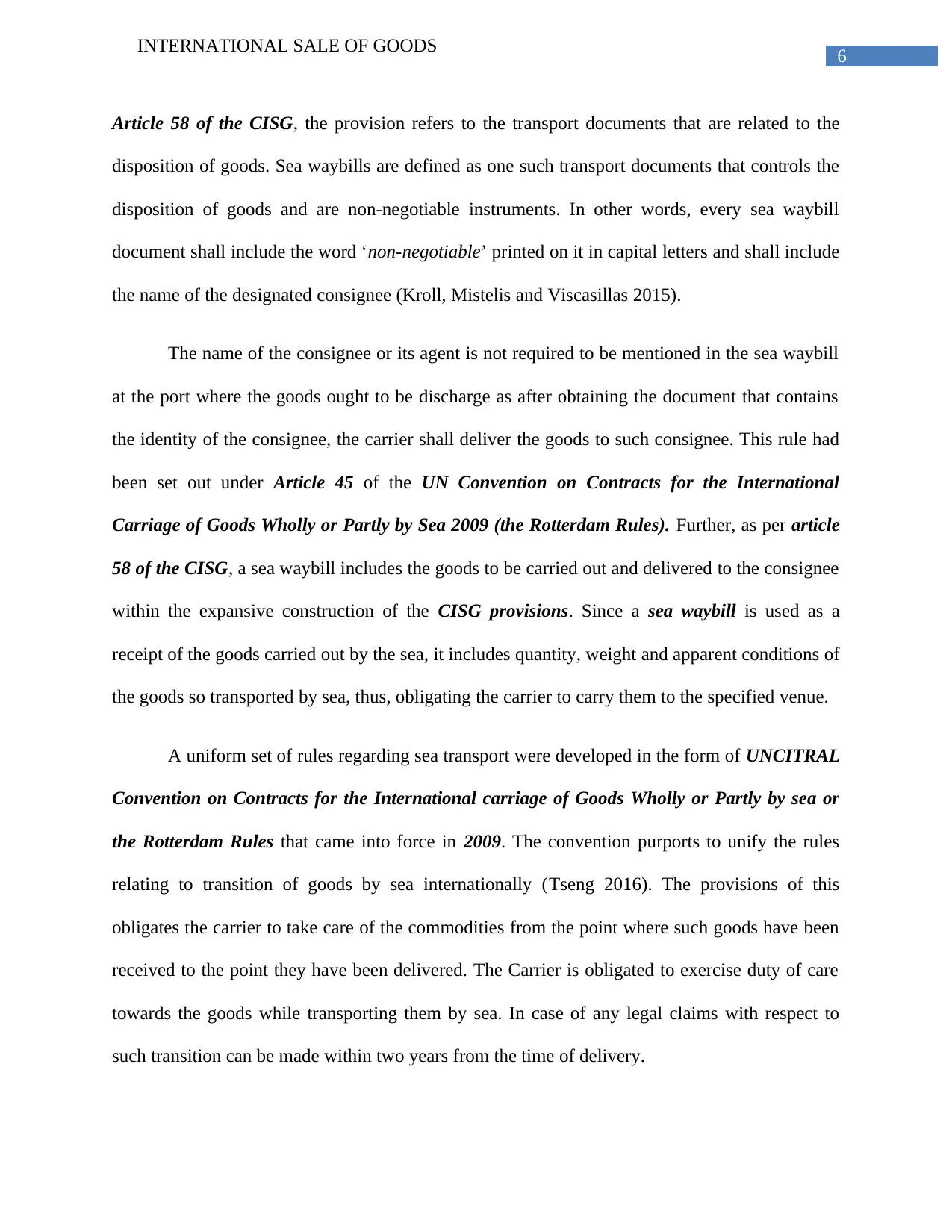
6
INTERNATIONAL SALE OF GOODS
Article 58 of the CISG, the provision refers to the transport documents that are related to the
disposition of goods. Sea waybills are defined as one such transport documents that controls the
disposition of goods and are non-negotiable instruments. In other words, every sea waybill
document shall include the word ‘non-negotiable’ printed on it in capital letters and shall include
the name of the designated consignee (Kroll, Mistelis and Viscasillas 2015).
The name of the consignee or its agent is not required to be mentioned in the sea waybill
at the port where the goods ought to be discharge as after obtaining the document that contains
the identity of the consignee, the carrier shall deliver the goods to such consignee. This rule had
been set out under Article 45 of the UN Convention on Contracts for the International
Carriage of Goods Wholly or Partly by Sea 2009 (the Rotterdam Rules). Further, as per article
58 of the CISG, a sea waybill includes the goods to be carried out and delivered to the consignee
within the expansive construction of the CISG provisions. Since a sea waybill is used as a
receipt of the goods carried out by the sea, it includes quantity, weight and apparent conditions of
the goods so transported by sea, thus, obligating the carrier to carry them to the specified venue.
A uniform set of rules regarding sea transport were developed in the form of UNCITRAL
Convention on Contracts for the International carriage of Goods Wholly or Partly by sea or
the Rotterdam Rules that came into force in 2009. The convention purports to unify the rules
relating to transition of goods by sea internationally (Tseng 2016). The provisions of this
obligates the carrier to take care of the commodities from the point where such goods have been
received to the point they have been delivered. The Carrier is obligated to exercise duty of care
towards the goods while transporting them by sea. In case of any legal claims with respect to
such transition can be made within two years from the time of delivery.
INTERNATIONAL SALE OF GOODS
Article 58 of the CISG, the provision refers to the transport documents that are related to the
disposition of goods. Sea waybills are defined as one such transport documents that controls the
disposition of goods and are non-negotiable instruments. In other words, every sea waybill
document shall include the word ‘non-negotiable’ printed on it in capital letters and shall include
the name of the designated consignee (Kroll, Mistelis and Viscasillas 2015).
The name of the consignee or its agent is not required to be mentioned in the sea waybill
at the port where the goods ought to be discharge as after obtaining the document that contains
the identity of the consignee, the carrier shall deliver the goods to such consignee. This rule had
been set out under Article 45 of the UN Convention on Contracts for the International
Carriage of Goods Wholly or Partly by Sea 2009 (the Rotterdam Rules). Further, as per article
58 of the CISG, a sea waybill includes the goods to be carried out and delivered to the consignee
within the expansive construction of the CISG provisions. Since a sea waybill is used as a
receipt of the goods carried out by the sea, it includes quantity, weight and apparent conditions of
the goods so transported by sea, thus, obligating the carrier to carry them to the specified venue.
A uniform set of rules regarding sea transport were developed in the form of UNCITRAL
Convention on Contracts for the International carriage of Goods Wholly or Partly by sea or
the Rotterdam Rules that came into force in 2009. The convention purports to unify the rules
relating to transition of goods by sea internationally (Tseng 2016). The provisions of this
obligates the carrier to take care of the commodities from the point where such goods have been
received to the point they have been delivered. The Carrier is obligated to exercise duty of care
towards the goods while transporting them by sea. In case of any legal claims with respect to
such transition can be made within two years from the time of delivery.
Paraphrase This Document
Need a fresh take? Get an instant paraphrase of this document with our AI Paraphraser
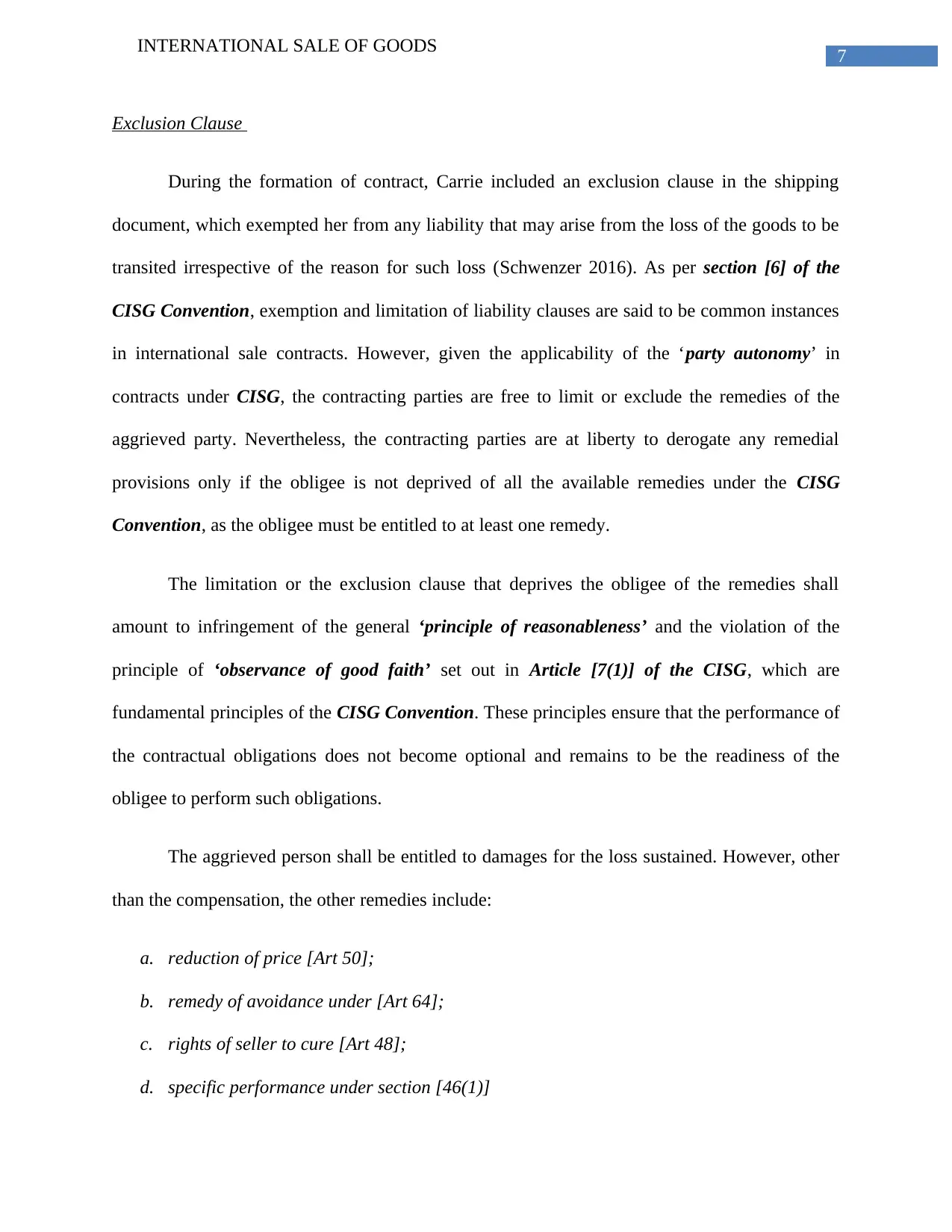
7
INTERNATIONAL SALE OF GOODS
Exclusion Clause
During the formation of contract, Carrie included an exclusion clause in the shipping
document, which exempted her from any liability that may arise from the loss of the goods to be
transited irrespective of the reason for such loss (Schwenzer 2016). As per section [6] of the
CISG Convention, exemption and limitation of liability clauses are said to be common instances
in international sale contracts. However, given the applicability of the ‘party autonomy’ in
contracts under CISG, the contracting parties are free to limit or exclude the remedies of the
aggrieved party. Nevertheless, the contracting parties are at liberty to derogate any remedial
provisions only if the obligee is not deprived of all the available remedies under the CISG
Convention, as the obligee must be entitled to at least one remedy.
The limitation or the exclusion clause that deprives the obligee of the remedies shall
amount to infringement of the general ‘principle of reasonableness’ and the violation of the
principle of ‘observance of good faith’ set out in Article [7(1)] of the CISG, which are
fundamental principles of the CISG Convention. These principles ensure that the performance of
the contractual obligations does not become optional and remains to be the readiness of the
obligee to perform such obligations.
The aggrieved person shall be entitled to damages for the loss sustained. However, other
than the compensation, the other remedies include:
a. reduction of price [Art 50];
b. remedy of avoidance under [Art 64];
c. rights of seller to cure [Art 48];
d. specific performance under section [46(1)]
INTERNATIONAL SALE OF GOODS
Exclusion Clause
During the formation of contract, Carrie included an exclusion clause in the shipping
document, which exempted her from any liability that may arise from the loss of the goods to be
transited irrespective of the reason for such loss (Schwenzer 2016). As per section [6] of the
CISG Convention, exemption and limitation of liability clauses are said to be common instances
in international sale contracts. However, given the applicability of the ‘party autonomy’ in
contracts under CISG, the contracting parties are free to limit or exclude the remedies of the
aggrieved party. Nevertheless, the contracting parties are at liberty to derogate any remedial
provisions only if the obligee is not deprived of all the available remedies under the CISG
Convention, as the obligee must be entitled to at least one remedy.
The limitation or the exclusion clause that deprives the obligee of the remedies shall
amount to infringement of the general ‘principle of reasonableness’ and the violation of the
principle of ‘observance of good faith’ set out in Article [7(1)] of the CISG, which are
fundamental principles of the CISG Convention. These principles ensure that the performance of
the contractual obligations does not become optional and remains to be the readiness of the
obligee to perform such obligations.
The aggrieved person shall be entitled to damages for the loss sustained. However, other
than the compensation, the other remedies include:
a. reduction of price [Art 50];
b. remedy of avoidance under [Art 64];
c. rights of seller to cure [Art 48];
d. specific performance under section [46(1)]
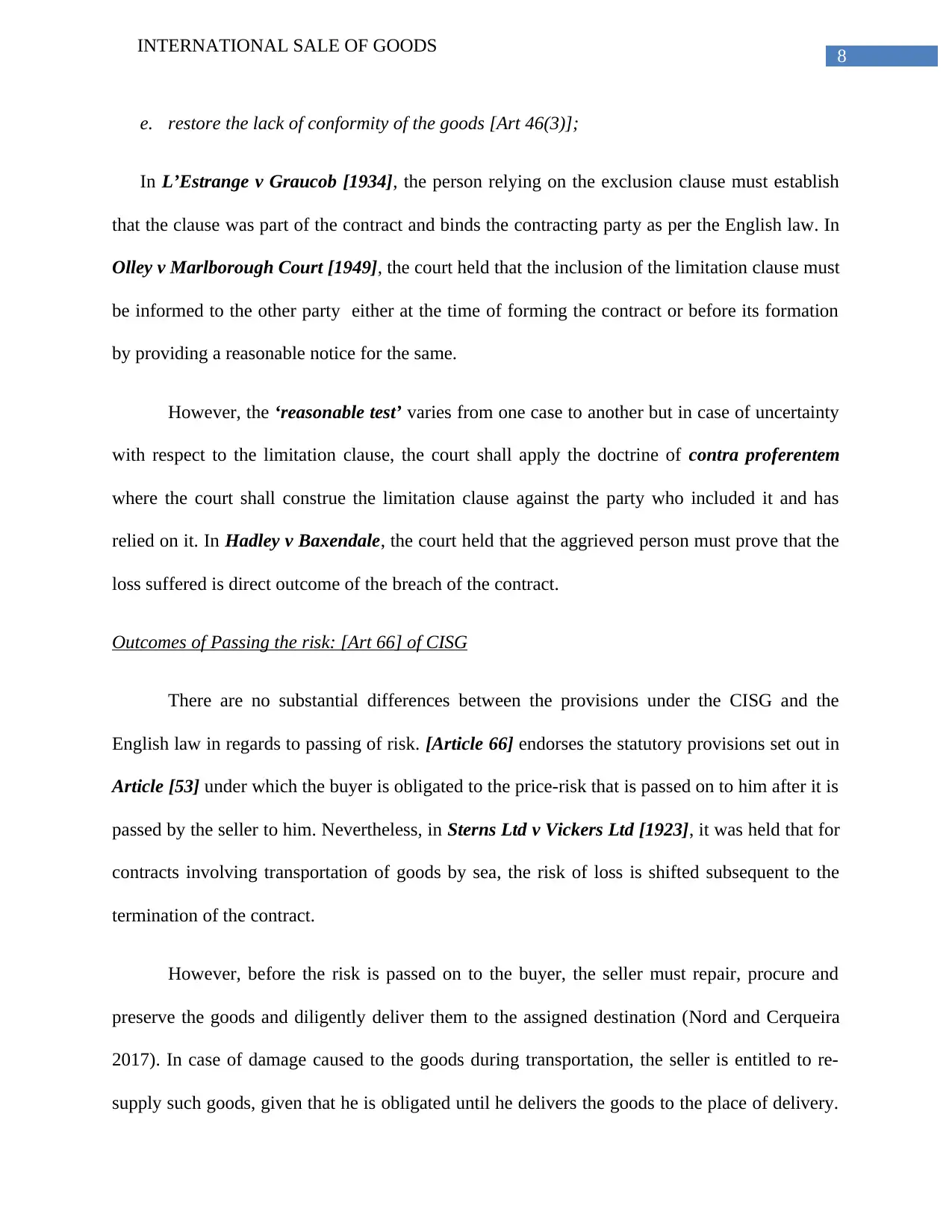
8
INTERNATIONAL SALE OF GOODS
e. restore the lack of conformity of the goods [Art 46(3)];
In L’Estrange v Graucob [1934], the person relying on the exclusion clause must establish
that the clause was part of the contract and binds the contracting party as per the English law. In
Olley v Marlborough Court [1949], the court held that the inclusion of the limitation clause must
be informed to the other party either at the time of forming the contract or before its formation
by providing a reasonable notice for the same.
However, the ‘reasonable test’ varies from one case to another but in case of uncertainty
with respect to the limitation clause, the court shall apply the doctrine of contra proferentem
where the court shall construe the limitation clause against the party who included it and has
relied on it. In Hadley v Baxendale, the court held that the aggrieved person must prove that the
loss suffered is direct outcome of the breach of the contract.
Outcomes of Passing the risk: [Art 66] of CISG
There are no substantial differences between the provisions under the CISG and the
English law in regards to passing of risk. [Article 66] endorses the statutory provisions set out in
Article [53] under which the buyer is obligated to the price-risk that is passed on to him after it is
passed by the seller to him. Nevertheless, in Sterns Ltd v Vickers Ltd [1923], it was held that for
contracts involving transportation of goods by sea, the risk of loss is shifted subsequent to the
termination of the contract.
However, before the risk is passed on to the buyer, the seller must repair, procure and
preserve the goods and diligently deliver them to the assigned destination (Nord and Cerqueira
2017). In case of damage caused to the goods during transportation, the seller is entitled to re-
supply such goods, given that he is obligated until he delivers the goods to the place of delivery.
INTERNATIONAL SALE OF GOODS
e. restore the lack of conformity of the goods [Art 46(3)];
In L’Estrange v Graucob [1934], the person relying on the exclusion clause must establish
that the clause was part of the contract and binds the contracting party as per the English law. In
Olley v Marlborough Court [1949], the court held that the inclusion of the limitation clause must
be informed to the other party either at the time of forming the contract or before its formation
by providing a reasonable notice for the same.
However, the ‘reasonable test’ varies from one case to another but in case of uncertainty
with respect to the limitation clause, the court shall apply the doctrine of contra proferentem
where the court shall construe the limitation clause against the party who included it and has
relied on it. In Hadley v Baxendale, the court held that the aggrieved person must prove that the
loss suffered is direct outcome of the breach of the contract.
Outcomes of Passing the risk: [Art 66] of CISG
There are no substantial differences between the provisions under the CISG and the
English law in regards to passing of risk. [Article 66] endorses the statutory provisions set out in
Article [53] under which the buyer is obligated to the price-risk that is passed on to him after it is
passed by the seller to him. Nevertheless, in Sterns Ltd v Vickers Ltd [1923], it was held that for
contracts involving transportation of goods by sea, the risk of loss is shifted subsequent to the
termination of the contract.
However, before the risk is passed on to the buyer, the seller must repair, procure and
preserve the goods and diligently deliver them to the assigned destination (Nord and Cerqueira
2017). In case of damage caused to the goods during transportation, the seller is entitled to re-
supply such goods, given that he is obligated until he delivers the goods to the place of delivery.
⊘ This is a preview!⊘
Do you want full access?
Subscribe today to unlock all pages.

Trusted by 1+ million students worldwide
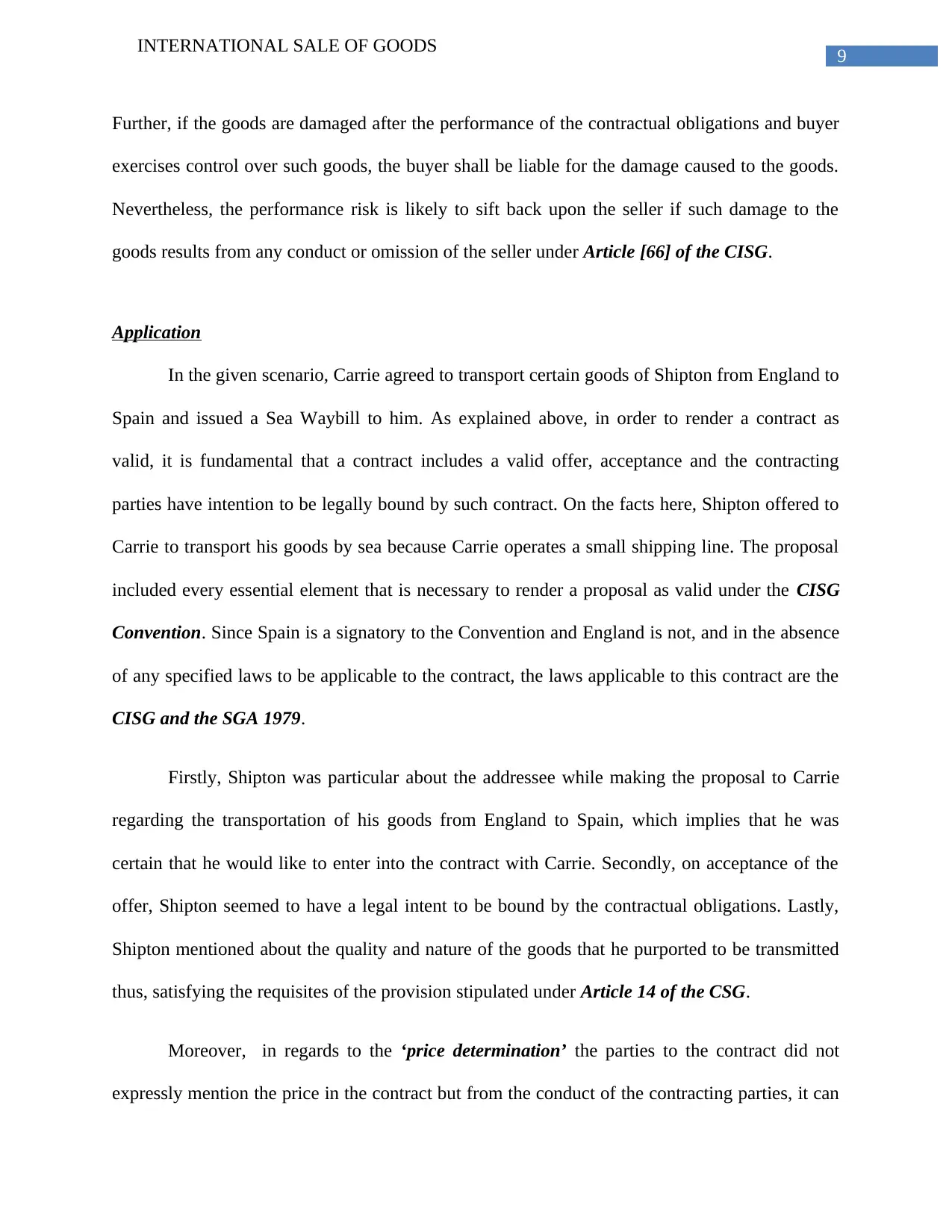
9
INTERNATIONAL SALE OF GOODS
Further, if the goods are damaged after the performance of the contractual obligations and buyer
exercises control over such goods, the buyer shall be liable for the damage caused to the goods.
Nevertheless, the performance risk is likely to sift back upon the seller if such damage to the
goods results from any conduct or omission of the seller under Article [66] of the CISG.
Application
In the given scenario, Carrie agreed to transport certain goods of Shipton from England to
Spain and issued a Sea Waybill to him. As explained above, in order to render a contract as
valid, it is fundamental that a contract includes a valid offer, acceptance and the contracting
parties have intention to be legally bound by such contract. On the facts here, Shipton offered to
Carrie to transport his goods by sea because Carrie operates a small shipping line. The proposal
included every essential element that is necessary to render a proposal as valid under the CISG
Convention. Since Spain is a signatory to the Convention and England is not, and in the absence
of any specified laws to be applicable to the contract, the laws applicable to this contract are the
CISG and the SGA 1979.
Firstly, Shipton was particular about the addressee while making the proposal to Carrie
regarding the transportation of his goods from England to Spain, which implies that he was
certain that he would like to enter into the contract with Carrie. Secondly, on acceptance of the
offer, Shipton seemed to have a legal intent to be bound by the contractual obligations. Lastly,
Shipton mentioned about the quality and nature of the goods that he purported to be transmitted
thus, satisfying the requisites of the provision stipulated under Article 14 of the CSG.
Moreover, in regards to the ‘price determination’ the parties to the contract did not
expressly mention the price in the contract but from the conduct of the contracting parties, it can
INTERNATIONAL SALE OF GOODS
Further, if the goods are damaged after the performance of the contractual obligations and buyer
exercises control over such goods, the buyer shall be liable for the damage caused to the goods.
Nevertheless, the performance risk is likely to sift back upon the seller if such damage to the
goods results from any conduct or omission of the seller under Article [66] of the CISG.
Application
In the given scenario, Carrie agreed to transport certain goods of Shipton from England to
Spain and issued a Sea Waybill to him. As explained above, in order to render a contract as
valid, it is fundamental that a contract includes a valid offer, acceptance and the contracting
parties have intention to be legally bound by such contract. On the facts here, Shipton offered to
Carrie to transport his goods by sea because Carrie operates a small shipping line. The proposal
included every essential element that is necessary to render a proposal as valid under the CISG
Convention. Since Spain is a signatory to the Convention and England is not, and in the absence
of any specified laws to be applicable to the contract, the laws applicable to this contract are the
CISG and the SGA 1979.
Firstly, Shipton was particular about the addressee while making the proposal to Carrie
regarding the transportation of his goods from England to Spain, which implies that he was
certain that he would like to enter into the contract with Carrie. Secondly, on acceptance of the
offer, Shipton seemed to have a legal intent to be bound by the contractual obligations. Lastly,
Shipton mentioned about the quality and nature of the goods that he purported to be transmitted
thus, satisfying the requisites of the provision stipulated under Article 14 of the CSG.
Moreover, in regards to the ‘price determination’ the parties to the contract did not
expressly mention the price in the contract but from the conduct of the contracting parties, it can
Paraphrase This Document
Need a fresh take? Get an instant paraphrase of this document with our AI Paraphraser
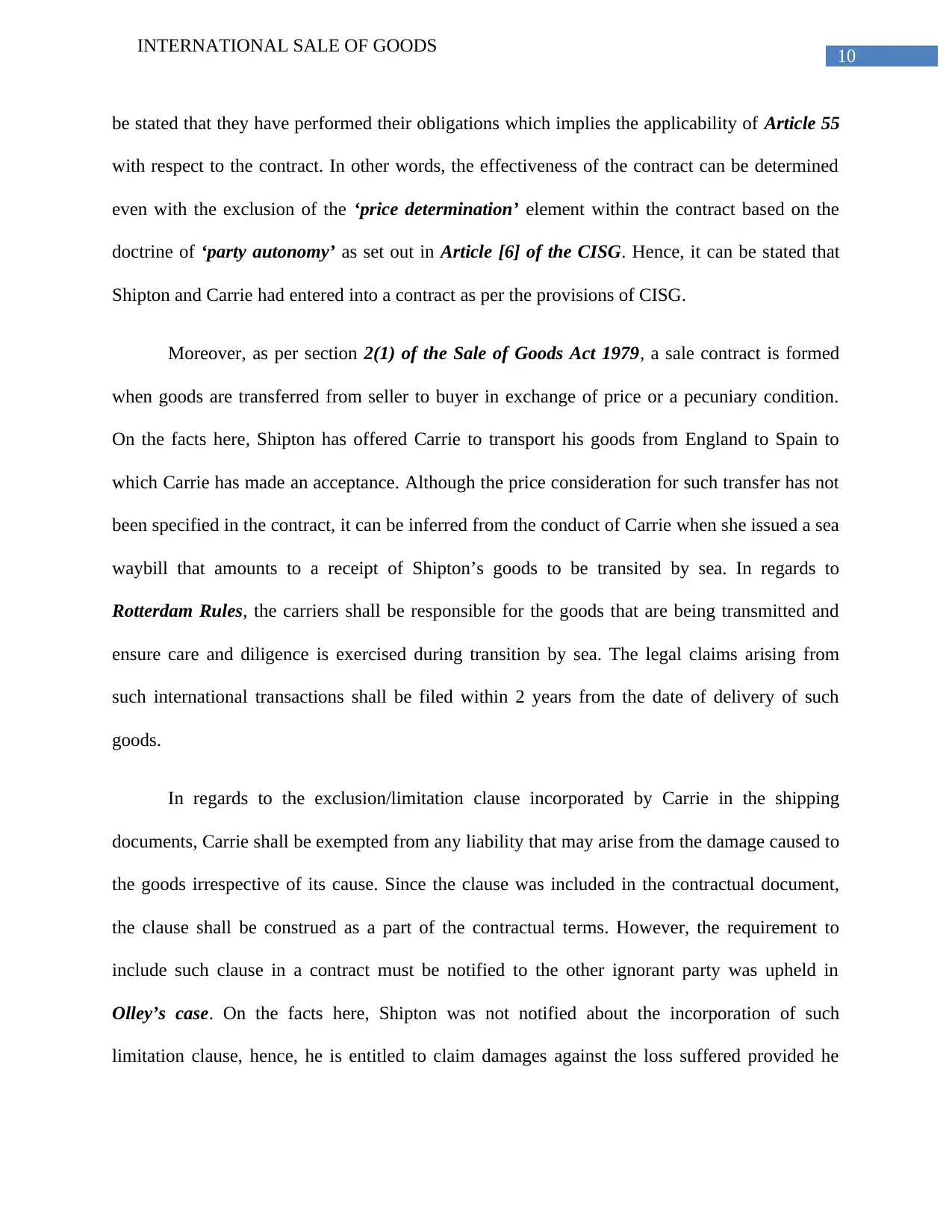
10
INTERNATIONAL SALE OF GOODS
be stated that they have performed their obligations which implies the applicability of Article 55
with respect to the contract. In other words, the effectiveness of the contract can be determined
even with the exclusion of the ‘price determination’ element within the contract based on the
doctrine of ‘party autonomy’ as set out in Article [6] of the CISG. Hence, it can be stated that
Shipton and Carrie had entered into a contract as per the provisions of CISG.
Moreover, as per section 2(1) of the Sale of Goods Act 1979, a sale contract is formed
when goods are transferred from seller to buyer in exchange of price or a pecuniary condition.
On the facts here, Shipton has offered Carrie to transport his goods from England to Spain to
which Carrie has made an acceptance. Although the price consideration for such transfer has not
been specified in the contract, it can be inferred from the conduct of Carrie when she issued a sea
waybill that amounts to a receipt of Shipton’s goods to be transited by sea. In regards to
Rotterdam Rules, the carriers shall be responsible for the goods that are being transmitted and
ensure care and diligence is exercised during transition by sea. The legal claims arising from
such international transactions shall be filed within 2 years from the date of delivery of such
goods.
In regards to the exclusion/limitation clause incorporated by Carrie in the shipping
documents, Carrie shall be exempted from any liability that may arise from the damage caused to
the goods irrespective of its cause. Since the clause was included in the contractual document,
the clause shall be construed as a part of the contractual terms. However, the requirement to
include such clause in a contract must be notified to the other ignorant party was upheld in
Olley’s case. On the facts here, Shipton was not notified about the incorporation of such
limitation clause, hence, he is entitled to claim damages against the loss suffered provided he
INTERNATIONAL SALE OF GOODS
be stated that they have performed their obligations which implies the applicability of Article 55
with respect to the contract. In other words, the effectiveness of the contract can be determined
even with the exclusion of the ‘price determination’ element within the contract based on the
doctrine of ‘party autonomy’ as set out in Article [6] of the CISG. Hence, it can be stated that
Shipton and Carrie had entered into a contract as per the provisions of CISG.
Moreover, as per section 2(1) of the Sale of Goods Act 1979, a sale contract is formed
when goods are transferred from seller to buyer in exchange of price or a pecuniary condition.
On the facts here, Shipton has offered Carrie to transport his goods from England to Spain to
which Carrie has made an acceptance. Although the price consideration for such transfer has not
been specified in the contract, it can be inferred from the conduct of Carrie when she issued a sea
waybill that amounts to a receipt of Shipton’s goods to be transited by sea. In regards to
Rotterdam Rules, the carriers shall be responsible for the goods that are being transmitted and
ensure care and diligence is exercised during transition by sea. The legal claims arising from
such international transactions shall be filed within 2 years from the date of delivery of such
goods.
In regards to the exclusion/limitation clause incorporated by Carrie in the shipping
documents, Carrie shall be exempted from any liability that may arise from the damage caused to
the goods irrespective of its cause. Since the clause was included in the contractual document,
the clause shall be construed as a part of the contractual terms. However, the requirement to
include such clause in a contract must be notified to the other ignorant party was upheld in
Olley’s case. On the facts here, Shipton was not notified about the incorporation of such
limitation clause, hence, he is entitled to claim damages against the loss suffered provided he
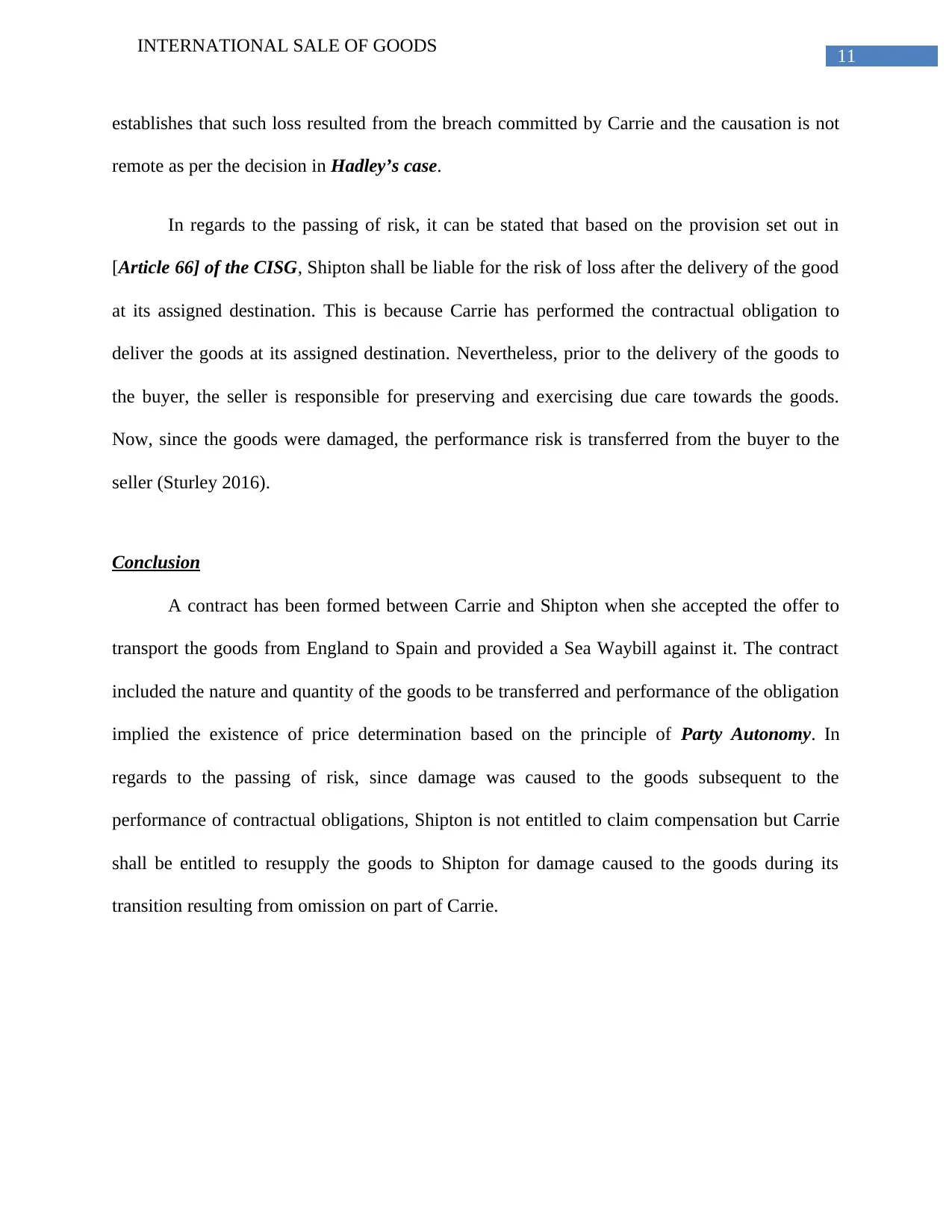
11
INTERNATIONAL SALE OF GOODS
establishes that such loss resulted from the breach committed by Carrie and the causation is not
remote as per the decision in Hadley’s case.
In regards to the passing of risk, it can be stated that based on the provision set out in
[Article 66] of the CISG, Shipton shall be liable for the risk of loss after the delivery of the good
at its assigned destination. This is because Carrie has performed the contractual obligation to
deliver the goods at its assigned destination. Nevertheless, prior to the delivery of the goods to
the buyer, the seller is responsible for preserving and exercising due care towards the goods.
Now, since the goods were damaged, the performance risk is transferred from the buyer to the
seller (Sturley 2016).
Conclusion
A contract has been formed between Carrie and Shipton when she accepted the offer to
transport the goods from England to Spain and provided a Sea Waybill against it. The contract
included the nature and quantity of the goods to be transferred and performance of the obligation
implied the existence of price determination based on the principle of Party Autonomy. In
regards to the passing of risk, since damage was caused to the goods subsequent to the
performance of contractual obligations, Shipton is not entitled to claim compensation but Carrie
shall be entitled to resupply the goods to Shipton for damage caused to the goods during its
transition resulting from omission on part of Carrie.
INTERNATIONAL SALE OF GOODS
establishes that such loss resulted from the breach committed by Carrie and the causation is not
remote as per the decision in Hadley’s case.
In regards to the passing of risk, it can be stated that based on the provision set out in
[Article 66] of the CISG, Shipton shall be liable for the risk of loss after the delivery of the good
at its assigned destination. This is because Carrie has performed the contractual obligation to
deliver the goods at its assigned destination. Nevertheless, prior to the delivery of the goods to
the buyer, the seller is responsible for preserving and exercising due care towards the goods.
Now, since the goods were damaged, the performance risk is transferred from the buyer to the
seller (Sturley 2016).
Conclusion
A contract has been formed between Carrie and Shipton when she accepted the offer to
transport the goods from England to Spain and provided a Sea Waybill against it. The contract
included the nature and quantity of the goods to be transferred and performance of the obligation
implied the existence of price determination based on the principle of Party Autonomy. In
regards to the passing of risk, since damage was caused to the goods subsequent to the
performance of contractual obligations, Shipton is not entitled to claim compensation but Carrie
shall be entitled to resupply the goods to Shipton for damage caused to the goods during its
transition resulting from omission on part of Carrie.
⊘ This is a preview!⊘
Do you want full access?
Subscribe today to unlock all pages.

Trusted by 1+ million students worldwide
1 out of 15
Related Documents
Your All-in-One AI-Powered Toolkit for Academic Success.
+13062052269
info@desklib.com
Available 24*7 on WhatsApp / Email
![[object Object]](/_next/static/media/star-bottom.7253800d.svg)
Unlock your academic potential
Copyright © 2020–2026 A2Z Services. All Rights Reserved. Developed and managed by ZUCOL.




